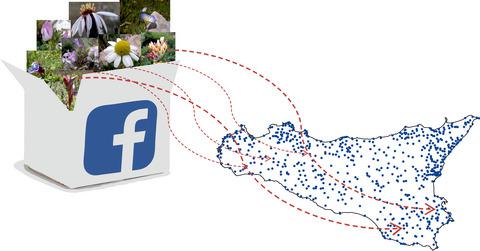当前位置:
X-MOL 学术
›
J. Appl. Ecol.
›
论文详情
Our official English website, www.x-mol.net, welcomes your feedback! (Note: you will need to create a separate account there.)
Facebook groups as citizen science tools for plant species monitoring
Journal of Applied Ecology ( IF 5.7 ) Pub Date : 2021-05-03 , DOI: 10.1111/1365-2664.13896 Corrado Marcenò 1 , Josep Padullés Cubino 1 , Milan Chytrý 1 , Emanuele Genduso 2 , Dario Salemi 3 , Alfonso La Rosa 4 , Alessandro Silvestre Gristina 5 , Emiliano Agrillo 6 , Gianmaria Bonari 7 , Gianpietro Giusso del Galdo 8 , Vincenzo Ilardi 9 , Flavia Landucci 1 , Riccardo Guarino 3
中文翻译:

Facebook团体作为植物物种监测的公民科学工具
更新日期:2021-05-17
Journal of Applied Ecology ( IF 5.7 ) Pub Date : 2021-05-03 , DOI: 10.1111/1365-2664.13896 Corrado Marcenò 1 , Josep Padullés Cubino 1 , Milan Chytrý 1 , Emanuele Genduso 2 , Dario Salemi 3 , Alfonso La Rosa 4 , Alessandro Silvestre Gristina 5 , Emiliano Agrillo 6 , Gianmaria Bonari 7 , Gianpietro Giusso del Galdo 8 , Vincenzo Ilardi 9 , Flavia Landucci 1 , Riccardo Guarino 3
Affiliation

|
- Social networks offer communication channels through which people share huge amounts of primary data that can be used for scientific analyses, including biodiversity research. To understand to what extent data extracted from social networks could complement data collected for scientific purposes, it is necessary to quantify the bias of such data.
- We analysed which plant traits increased the probability of a wild‐growing plant species to be photographed and posted to a social network based on the data from an unstructured citizen science tool; a Facebook group focused on the vascular flora of Sicily (Italy). Then, we compared botanical data collected by this Facebook group members with data collected by scientists in 6,366 vegetation plots sampled across Sicily, stored in the EVA database.
- Our results suggested that data proceeding from the analysed Facebook group were affected by various sampling biases, which differed from the biases inherent to other types of biodiversity data such as those from vegetation plots.
- Facebook users recorded a higher proportion of red‐listed and alien species than vegetation scientists. Therefore, social networks can provide a valuable complement to the data collected by scientists for research purposes.
- Synthesis and applications. Despite Facebook does not support geotagging and interface for data access and analysis, it is an invaluable source of biodiversity data that could complement those collected by professional researchers. The main advantage of data from social networks is their high dynamism, as they report large amounts of species occurrences in almost real time. Therefore, citizen science data from a Facebook group where the records are curated by expert volunteers can be used (a) for monitoring population dynamics of threatened and alien species; (b) as a source of additional data on rare species occurrences, particularly for plants that are attractive for amateur botanists, such as orchids; (c) for early warning systems of potential new invasions; and (4) for phenological studies, especially at the beginning of the flowering season.
中文翻译:

Facebook团体作为植物物种监测的公民科学工具
- 社交网络提供了交流渠道,人们可以通过交流渠道共享大量的原始数据,这些数据可以用于科学分析,包括生物多样性研究。为了了解从社交网络中提取的数据可以在多大程度上补充出于科学目的而收集的数据,有必要对此类数据的偏见进行量化。
- 我们基于来自非结构化公民科学工具的数据,分析了哪些植物性状增加了野生生长植物被拍照并发布到社交网络的可能性;一个Facebook小组专注于西西里岛(意大利)的血管区系。然后,我们将这个Facebook小组成员收集的植物数据与科学家在存储在EVA数据库中的西西里岛6366个植被样地中收集的数据进行了比较。
- 我们的结果表明,来自被分析的Facebook组的数据受到各种采样偏差的影响,这不同于其他类型的生物多样性数据(例如来自植被地块)固有的偏差。
- 与植被科学家相比,Facebook用户记录在红色名录和外来物种中的比例更高。因此,社交网络可以为科学家出于研究目的而收集的数据提供有价值的补充。
- 综合与应用。尽管Facebook不支持地理标记和用于数据访问和分析的界面,但它是生物多样性数据的宝贵来源,可以补充专业研究人员收集的数据。来自社交网络的数据的主要优势是其高动态性,因为它们几乎实时地报告大量物种的发生。因此,可以使用来自Facebook小组的公民科学数据,由专家志愿人员整理记录,该组织(a)监测受威胁和外来物种的种群动态;(b)作为稀有物种发生情况补充数据的来源,尤其是对于那些对业余植物学家有吸引力的植物,例如兰花;(c)用于潜在的新入侵的预警系统;(4)进行物候研究,尤其是在开花季节开始时。


























 京公网安备 11010802027423号
京公网安备 11010802027423号